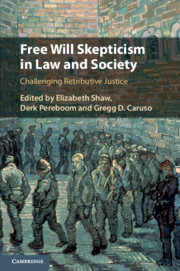Book contents
- Free Will Skepticism in Law and Society
- Free Will Skepticism in Law and Society
- Copyright page
- Contents
- Contributors
- Chapter 1 Free Will Skepticism in Law and Society: An Overview
- Part I On the Practical Implications of Free Will Skepticism
- Part II Alternatives to Retributive Punishment
- Chapter 5 Free Will Skepticism and Prevention of Crime
- Chapter 6 Deontology and Deterrence for Free Will Deniers
- Chapter 7 Free Will Skepticism, General Deterrence, and the “Use” Objection
- Part III Free Will Skepticism and the Criminal Justice System
- Index
- References
Chapter 7 - Free Will Skepticism, General Deterrence, and the “Use” Objection
from Part II - Alternatives to Retributive Punishment
Published online by Cambridge University Press: 26 August 2019
- Free Will Skepticism in Law and Society
- Free Will Skepticism in Law and Society
- Copyright page
- Contents
- Contributors
- Chapter 1 Free Will Skepticism in Law and Society: An Overview
- Part I On the Practical Implications of Free Will Skepticism
- Part II Alternatives to Retributive Punishment
- Chapter 5 Free Will Skepticism and Prevention of Crime
- Chapter 6 Deontology and Deterrence for Free Will Deniers
- Chapter 7 Free Will Skepticism, General Deterrence, and the “Use” Objection
- Part III Free Will Skepticism and the Criminal Justice System
- Index
- References
Summary
This chapter defends the view that free will skeptics can endorse general deterrence as a justifiable aim of legal punishment. It does not claim that it is the justifiable aim, or the main aim, but rather that it is a justifiable aim among others. It takes as its target Derk Pereboom’s claim that general deterrence is not a justifiable aim of punishment since it suffers from the “use” objection, according to which general deterrence is wrong because it involves harming some, without their consent, in order to benefit others. The author responds by arguing that the use objection myopically focuses on only one aspect of a system of general deterrent punishment, and that, when we take full account of the complexity of this sort of punishment within a reasonably just legal system, we can see that it need not involve an impermissible kind of use. It further argues that Pereboom’s positive account of how to respond to crime is insufficient for good social policy. It concludes by offering a sketch of an account that combines the measures that Pereboom advocates with others designed to promote general deterrence.
- Type
- Chapter
- Information
- Free Will Skepticism in Law and SocietyChallenging Retributive Justice, pp. 139 - 158Publisher: Cambridge University PressPrint publication year: 2019



